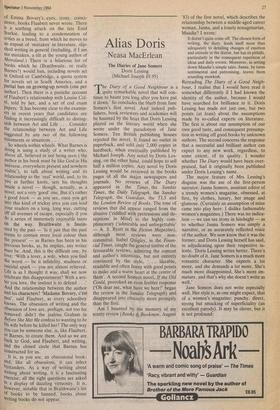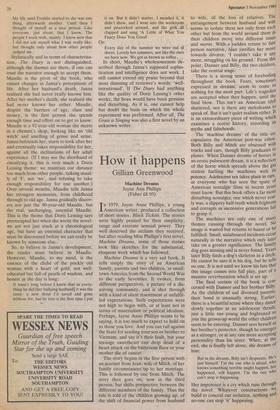Alias Doris
Neasa MacErlean
The Diaries of Jane Somers Doris Lessing (Michael Joseph £9.95) 'The Diary of a Good Neighbour is a I quite remarkable novel that will con- tinue to haunt you long after you have put it down.' So concludes the blurb from Jane Somers's first novel. And indeed pub- lishers, book reviewers and academics will be haunted by the hoax that Doris Lessing played on the literary world when she wrote under the pseudonym of Jane Somers. Ten British publishing houses rejected the novel. It found no outlet in paperback, and sold only 2,000 copies in hardback, when eventually published by Michael Joseph. Any novel by Doris Les- sing, on the other hand, could hope to sell half a million copies. Any novel by Doris Lessing would be reviewed in the books pages of all the major newspapers and journals. No reviews of The Diary appeared in the Times, the Sunday Times, the Daily Telegraph, the Sunday Telegraph, the Guardian, the TLS and the London Review of Books. The tone of reviews that did appear ranged from the abusive (`riddled with pretensions and de- ceptions' in Mind) to the highly com- plimentary (`admirable and unforgettable' — A. S. Byatt in the Fiction Magazine), although most reviews were non- committal. Isabel Quigley, in the Finan- cial Times, caught the general timbre of the favourable reviews, admiring the content and author's intentions, but not entirely convinced by the style, . . likeable, readable and often funny with good points to make and a warm heart at the centre of them'. A second Somers novel, If the Old Could, provoked an even feebler response (`Oh dear me, what have we here?' began the review in the Sunday Telegraph) and disappeared into obscurity more promptly than the first.
Am I haunted by the memory of my scanty review (Books & Bookmen, August
83) of the first novel, which describes the relationship between a middle-aged career woman, Janna, and a lonely nonagenarian, Maudie? I wrote:
It doesn't quite come off. The chosen form of writing, the diary, lends itself more than adequately to detailing changes of emotion and attitude in the diarist, but has its pitfalls, particularly in the consequent repetition of ideas and daily events. Moreover, in setting down Maudie's simple tales, Janna, by turns sentimental and patronising, leaves them sounding mawkish.
Rereading The Diary of a Good Neigh- bour, I realise that I would have read it somewhat differently if I had known the identity of the author, because I would have searched for brilliance in it. Doris Lessing has made not just one, but two points (at least) about the assumptions made by so-called experts on literature. The first is about our assumption of our own good taste, and consequent presump- tion in writing off good books by unknown authors. The second concerns the response that a successful and brilliant author can expect to any new work, regardless, to some extent, of its quality. I wonder whether The Diary would have been over- praised, had it originally been published under Doris Lessing's name.
The major feature of Mrs Lessing's disguise was the use of the first-person narrator: Janna Somers, assistant editor of a trendy women's magazine, obsessed, at first, by clothes, luxury, her image and 'glamour. (Certainly an assumption of mine came into play here: I dislike fashionable women's magazines.) There was no indica- tion — we can see irony in hindsight — as to whether Janna Somers was simply a narrator, or an accurately reflected voice of the author. We now know that it was the former, and Doris Lessing herself has said, in adjudicating upon their respective ta- lents: 'Doris Lessing writes better. There's no doubt of it. Jane Somers is a much more romantic character. She expects a lot more, and she demands a lot more. She's much more disappointed. She's more im- mature, and that's why she doesn't write as well.'
Jane Somers does not write especially well. Her style is, as one might expect, that of a women's magazine: punchy, direct, strong but smacking of superficiality (an excellent parody). It may be clever, but it is not profound:
My life until Freddie started to die was one thing, afterwards another. Until then I thought of myself as a nice person. Like everyone, just about, that I know. The people I work with, mainly. I know now that I did not ask myself what I was really like, but thought only about how other people judged me.
Stylistically and in terms of characterisa- tion, The Diary is not distinguished, although the themes are there, if one can trust the narrator enough to accept them. Maudie is the pivot of the book, who causes changes in Janna's perceptions of life. After her husband's death, Janna realised she had never really known him. After her mother's death, she realised she had never known her either. Maudie, despite the barriers of age, class and money, is the first person she spends enough time and effort on to get to know. Maudie is a 92-year-old woman she meets in a chemist's shop, looking like an 'old witch' and smelling of grime and urine. Janna befriends her, starts to look after her and eventually takes responsibility for her, against all the inclinations of her adult experience. (If I may use the shorthand of classifying it, this is very much a Doris Lessing theme: we maintain our distance too much from other people, talking usual- ly of 'I', not 'we', and refusing to take enough responsibility for one another.) Over several months, Maudie tells Janna her strongest memories, from childhood through to old age. Janna gradually discov- ers not just the 90-year-old Maudie, but the real, unchanging, essential Maudie. This is the theme that Doris Lessing says preoccupied her when she wrote the novel: we are not just stuck at a chronological age, but have an essential character that must be discovered before we can really be known by someone else.
So, to believe in Janna's development, the reader must believe in Maudie. However, Maudie, to my mind, is the essence of the cliché of the prickly old woman with a heart of gold, not well- educated but full of pearls of wisdom, and honest as the day is long:
It wasn't long before I knew that in every- thing he did [her bullying husband] it was the same: a new dress I'd saved and gone without for, but he tore it the first time I put
it on. But it didn't matter, I mended it, it didn't show, and I went into the workroom and peacocked around, and the girls all clapped and sang 'A Little of What You Fancy Does You Good'.
Or:
Every day of the summer we were out of doors. Lovely hot summers, not like the ones we have now. We got as brown as toffee . . .
In short, Maudie's wholesomeness de- scribed through Janna's supposed sophis- tication and intelligence does not work. I still cannot extend my praise beyond that most damning of reviewer's words: 'well- intentioned'. If The Diary had anything like the quality of Doris Lessing's other works, the hoax would have been genuine and disturbing. As it is, one cannot help but doubt the basis on which the whole experiment was performed. After all, The Grass is Singing was also a first novel by an unknown writer.











































 Previous page
Previous page